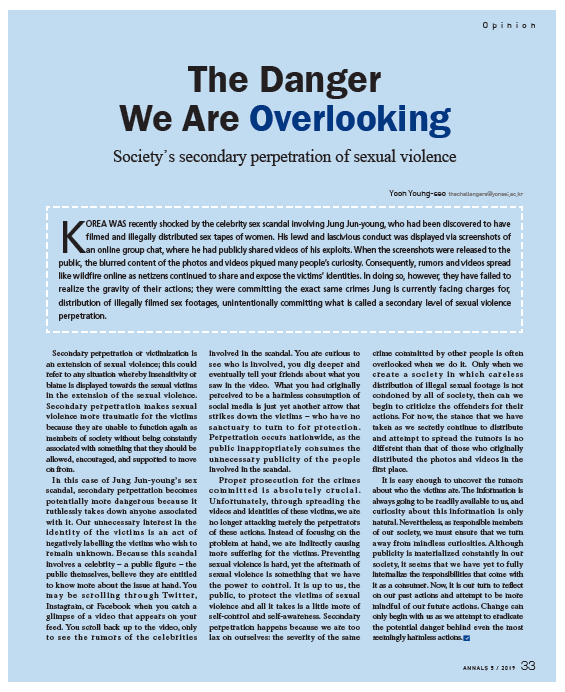KOREA WAS recently shocked by the celebrity sex scandal involving Jung Jun-young, who had been discovered to have filmed and illegally distributed sex tapes of women. His lewd and lascivious conduct was displayed via screenshots of an online group chat, where he had publicly shared videos of his exploits. When the screenshots were released to the public, the blurred content of the photos and videos piqued many people’s curiosity. Consequently, rumors and videos spread like wildfire online as netizens continued to share and expose the victims’ identities. In doing so, however, they have failed to realize the gravity of their actions; they were committing the exact same crimes Jung is currently facing charges for, the distribution of illegally filmed sex footages, unintentionally committing what is called a secondary level of sexual violence perpetration.
Secondary perpetration or victimization is an extension of sexual violence; this could refer to any situation whereby insensitivity or blame is displayed towards the sexual victims in the extension of the sexual violence. Secondary perpetration makes sexual violence more traumatic for the victims because they are unable to function again as members of society without being constantly associated with something that they should be allowed, encouraged, and supported to move on from.
In this case of Jung Jun-young’s sex scandal, secondary perpetration becomes potentially more dangerous because it ruthlessly takes down anyone associated with it. Our unnecessary interest in the identity of the victims is an act of negatively labelling the victims who wish to remain unknown. Because this scandal involves a celebrity – a public figure – the public themselves, believe they are entitled to know more about the issue at hand. You may be scrolling through Twitter, Instagram, or Facebook when you catch a glimpse of a video that appears on your feed. You scroll back up to the video, only to see the rumors of the celebrities involved in the scandal. You are curious to see who is involved, you dig deeper and eventually tell your friends about what you saw in the video. What you had originally perceived to be a harmless consumption of social media is just yet another arrow that strikes down the victims – who have no sanctuary to turn to for protection. Perpetration occurs nationwide, as the public inappropriately consumes the unnecessary publicity of the people involved in the scandal.
Proper prosecution for the crimes committed is absolutely crucial. Unfortunately, through spreading the videos and identities of these victims, we are no longer attacking merely the perpetrators of these actions. Instead of focusing on the problem at hand, we are indirectly causing more suffering for the victims. Preventing sexual violence is hard, yet the aftermath of sexual violence is something that we have the power to control. It is up to us, the public, to protect the victims of sexual violence and all it takes is a little more of self-control and self-awareness. Secondary perpetration happens because we are too lax on ourselves: the severity of the same crime committed by other people is often overlooked when we do it. Only when we create a society in which careless distribution of illegal sexual footage is not condoned by all of society, then can we begin to criticize the offenders for their actions. For now, the stance that we have taken as we secretly continue to distribute and attempt to spread the rumors is no different than that of those who originally distributed the photos and videos in the first place.
It is easy enough to uncover the rumors about who the victims are. The information is always going to be readily available to us, and curiosity about this information is only natural. Nevertheless, as responsible members of our society, we must ensure that we turn away from mindless curiosities. Although publicity is materialized constantly in our society, it seems that we have yet to fully internalize the responsibilities that come with it as a consumer. Now, it is our turn to reflect on our past actions and attempt to be more mindful of our future actions. Change can only begin with us as we attempt to eradicate the potential danger behind even the most seemingly harmless actions.


